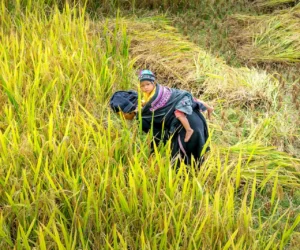
In the upcoming year, Unilever is poised for significant acceleration in projects centered around regenerative agriculture practices. Lucas Urbano, Unilever’s Head of Regenerative Agriculture in Business Operations, underscores the importance of partnerships with farmers and technology experts as pivotal to scaling up these initiatives. Embracing regenerative agriculture is not just a strategic move but a necessity for Unilever’s supply chain, enhancing resilience against the impacts of climate change.
Unilever’s ambitious target for 2024 is to expand its regenerative agriculture projects from 17 to 38, marking a substantial commitment to sustainable practices. Central to this expansion are partnerships, which will play a crucial role in fostering resilient agriculture supply chains.
Lucas Urbano emphasizes that the time for piloting regenerative agriculture initiatives is over; now is the time for significant scaling. Regenerative agriculture stands as one of the ten key action areas identified by Unilever to achieve its near-term greenhouse gas reduction targets outlined in the Climate Transition Action Plan 2030.
The driving force behind this acceleration is teamwork. Lucas stresses the importance of partnerships, both on the ground with farmers and online with data experts, to achieve acceleration, scalability, and impact. Transitioning to regenerative agriculture is vital for Unilever due to its heavy reliance on agricultural commodities such as soy, tomatoes, coconut, and shea, which are used in various brands.
Agricultural supply chains face multifaceted challenges, including climate disruptions and market volatility. Embracing regenerative agriculture practices fosters healthier ecosystems, resilient farming systems, and reduced dependency on costly inputs like fertilizers. These practices align closely with Unilever’s business objectives and sustainability strategy, promising a more stable and efficient supply chain.
Partnerships are integral to facilitating this transition. Unilever recognizes that transitioning to regenerative agriculture requires collaboration across the entire supply chain, from farmers to suppliers, buyers, and brands. Unilever aims to act as a catalyst for change, leveraging partnerships with agricultural experts, implementation partners, NGOs, governments, and agencies to drive adoption of sustainable practices and mitigate risks for farmers.
Unilever’s recent partnership with data experts like Regrow exemplifies its commitment to leveraging technology for sustainability. Through data collection and analysis, Unilever aims to model best practices, monitor GHG emissions, and optimize project performance. Access to data empowers farmers to make informed decisions, enhancing the sustainability and efficiency of food production.
Data plays a pivotal role in ensuring the success of sustainability investments for both Unilever and farmers. Comprehensive and accurate data enable informed decision-making, driving resilience and sustainability across the supply chain. Promising outcomes from Unilever’s agriculture programs in 2022 demonstrate the tangible benefits of regenerative agriculture, including optimized resource usage and reduced emissions.
As momentum builds behind the transition to regenerative agriculture, Unilever is committed to collaborating with partners to drive bold and sustainable change. Initiatives like the “Regenerate your vibes” campaign in Italy showcase Unilever’s commitment to sustainable practices and set the stage for future innovation in food production. Together with partners, Unilever looks forward to shaping a more sustainable future for society and business alike.




